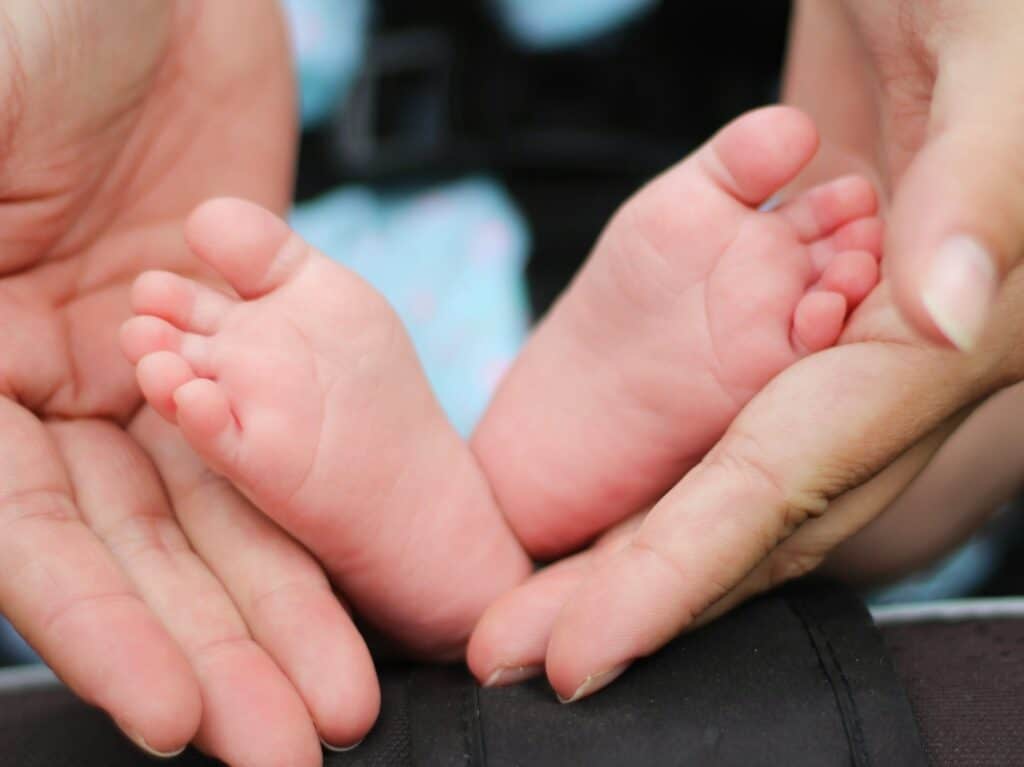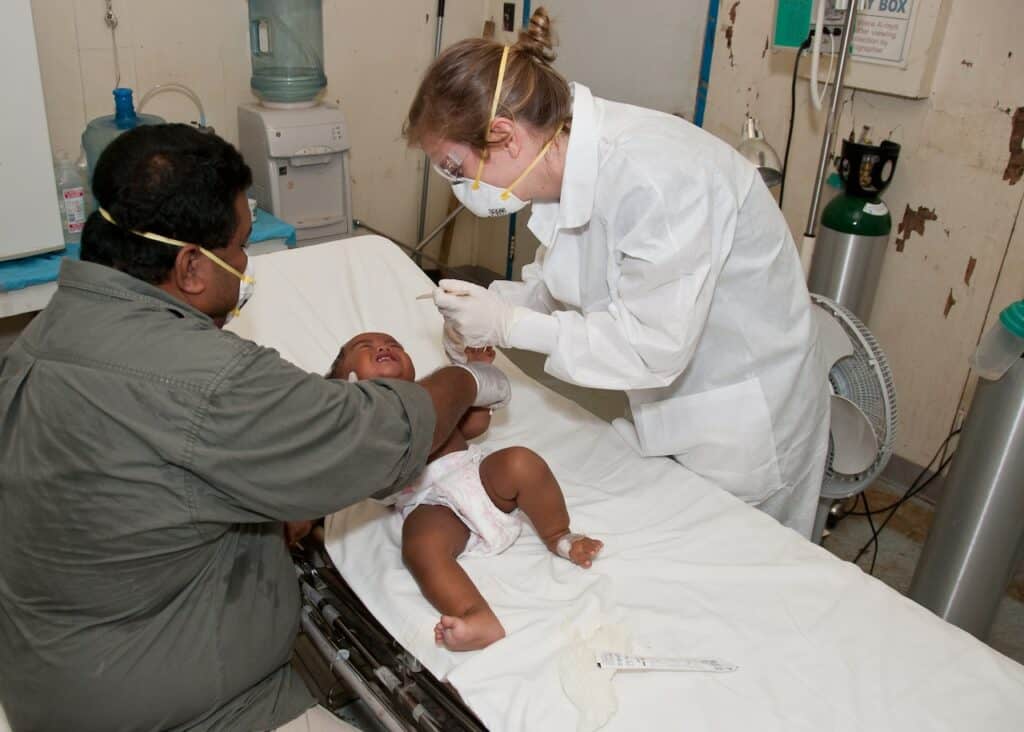Newborns are a bundle of joy, but they can also be a source of worry for new parents. One common concern is when their legs shake or tremble. While this can be alarming, it is often normal and not a cause for concern. However, it’s important to understand that why does my newborns leg shake to be able to identify when it is a sign of a serious condition.
Understanding Newborn Leg Shaking
Newborn leg shaking, also known as jitteriness, is a common occurrence in the first few weeks of life. It is characterized by small, rhythmic movements in the legs, arms, or entire body. These movements are typically not violent or forceful but can appear like a mild tremor or shivering.
Common Causes of Newborn Leg Shaking
There are several reasons why newborns experience leg shaking. One common cause is the immature nervous system. As the baby’s nervous system develops, it can cause the body to twitch or shake. Another cause is low blood sugar levels, which can cause jitteriness in newborns. Additionally, medications taken during delivery or withdrawal from drugs taken by the mother can also cause leg shaking in newborns.
Key Takeaways
- Newborn leg shaking is often normal and not a cause for concern.
- Understanding the common causes of newborn leg shaking can help identify when it is a sign of a serious condition.
- Treatment and prevention methods can help alleviate newborn leg shaking.
Understanding Newborn Leg Shaking

Newborns are known for their jerky and jittery movements, and leg shaking is a common occurrence in infants. While it may be alarming for parents to witness their newborn’s leg shaking, it is usually nothing to worry about. In most cases, newborn leg shaking is a normal part of a baby’s development.
The medical term for newborn leg shaking is “jitteriness,” which refers to fine tremors or jerking movements. These movements are a result of the baby’s immature nervous system, which is still developing and adjusting to life outside the womb.
There are several causes of newborn leg shaking, including:
-
Immature nervous system: As mentioned earlier, newborns have an immature nervous system, which can cause their legs to shake or jerk involuntarily.
-
Overstimulation: Newborns can become overstimulated by their environment, which can lead to jitteriness and shaking.
-
Hunger: A hungry baby may shake their legs as a way to communicate their need for food.
-
Sleep: Newborns may shake their legs while they sleep, which is a normal part of their sleep cycle.
While newborn leg shaking is usually normal, there are some instances where it may be a cause for concern. If the shaking is accompanied by other symptoms, such as fever or lethargy, it is important to seek medical attention.
In conclusion, newborn leg shaking is a normal part of a baby’s development and is usually nothing to worry about. However, if parents have any concerns, they should speak with their pediatrician to rule out any underlying medical conditions.
Common Causes of Newborn Leg Shaking

Newborn leg shaking can be a cause of concern for many parents. However, in most cases, it is not a serious issue and can be easily resolved. Here are some common causes of newborn leg shaking:
1. Moro Reflex
The Moro reflex, also known as the startle reflex, is a normal reflex that newborns have. It is triggered by a sudden movement or loud noise and causes the baby to extend their arms and legs, then quickly bring them back in. This reflex can cause leg shaking.
2. Immature Nervous System
Newborns have an immature nervous system, which can cause involuntary movements such as leg shaking. As the nervous system develops, these movements usually disappear.
3. Myoclonus
Myoclonus is a type of involuntary movement that can cause leg shaking in newborns. It is usually harmless and can be caused by a variety of factors, including sleep myoclonus.
4. Low Blood Sugar
Low blood sugar, also known as hypoglycemia, can cause leg shaking in newborns. This can happen if the baby is hungry or if the mother has low blood sugar levels.
5. Cold
If a baby is cold, they may shake their legs in an attempt to warm up. It is important to keep newborns warm and comfortable.
6. Caffeine
Caffeine can pass through breast milk and can cause leg shaking in newborns. Mothers who consume caffeine should monitor their baby’s reaction.
7. Alcohol and Substance Use
Alcohol and substance use during pregnancy can cause leg shaking in newborns. It is important for mothers to avoid these substances during pregnancy.
8. Low Norepinephrine Levels
Low levels of norepinephrine, a hormone that helps regulate blood sugar levels, can cause leg shaking in newborns. This can happen if the mother has diabetes or if the baby is premature.
Overall, newborn leg shaking is usually not a cause for concern. However, if the shaking is accompanied by other symptoms or persists for a long time, it is important to consult a doctor.
Identifying Serious Conditions
In some rare cases, shaking legs in newborns can be a symptom of a more serious condition. It is important to be aware of these conditions and seek medical attention if you suspect that your newborn may be affected by one of them.

Seizures
Seizures are a serious neurological condition that can cause shaking or convulsions in newborns. If your newborn’s shaking is accompanied by other symptoms such as difficulty breathing, loss of consciousness, or abnormal eye movements, it may be a sign of a seizure. Seek medical attention immediately if you suspect that your newborn is having a seizure.
Nocturnal Myoclonus
Nocturnal myoclonus, also known as periodic limb movement disorder, is a condition characterized by involuntary leg movements during sleep. These movements can be rhythmic and repetitive, and can cause shaking or twitching in the legs. If your newborn’s shaking only occurs during sleep, it may be a sign of nocturnal myoclonus. Consult with a pediatrician if you suspect that your newborn may have this condition.
Cerebral Palsy
Cerebral palsy is a neurological disorder that affects movement and coordination. It can cause shaking or tremors in the legs, as well as other symptoms such as stiffness, weakness, and difficulty with balance. If your newborn’s shaking is accompanied by other symptoms of cerebral palsy, such as delayed motor development or difficulty feeding, it may be a sign of this condition. Consult with a doctor if you suspect that your newborn may have cerebral palsy.
Brain Damage
In rare cases, shaking legs in newborns can be a sign of brain damage. Brain damage can be caused by a variety of factors, including oxygen deprivation during birth, trauma, or infection. If your newborn’s shaking is accompanied by other symptoms of brain damage, such as seizures, difficulty breathing, or abnormal reflexes, it may be a sign of this condition. Seek medical attention immediately if you suspect that your newborn may have brain damage.
In summary, if your newborn’s shaking is accompanied by other symptoms or seems to be getting worse, it is important to seek medical attention. A doctor or pediatrician can perform tests such as an MRI to diagnose any underlying medical conditions and provide appropriate treatment.
Symptoms and Signs to Look Out For

Newborns may exhibit a variety of movements and behaviors that can be concerning to parents. One such behavior is leg shaking. While it is not uncommon for newborns to shake their legs, it can be a sign of an underlying issue.
Symptoms to look out for include weakness, difficulty breathing, an arched back, colic, and irritability. If a newborn is experiencing any of these symptoms in conjunction with leg shaking, it is important to seek medical attention.
Weakness in a newborn can be a sign of a neurological issue, such as cerebral palsy. Difficulty breathing can indicate a respiratory issue, such as bronchiolitis. An arched back may be a sign of discomfort or pain, such as from gas or reflux. Colic and irritability can also be signs of discomfort or pain.
It is important to note that not all leg shaking in newborns is cause for concern. Some newborns may shake their legs as a way to self-soothe or as a reflexive movement. However, if a newborn is exhibiting any of the aforementioned symptoms in addition to leg shaking, it is important to speak with a healthcare provider to rule out any underlying issues.
Treatment and Prevention Methods
In most cases, newborn leg shaking does not require any specific treatment. The tremors usually disappear on their own within a few weeks or months. However, if the shaking is caused by an underlying medical condition, treatment may be necessary.
If the newborn’s leg shaking is caused by hypoglycemia, the doctor may recommend feeding the baby more frequently or giving them glucose supplements. If the tremors are caused by a seizure disorder, the baby may need to take anticonvulsant medication.
To prevent newborn leg shaking, parents should ensure that their baby is getting enough sleep, is well-fed, and is kept warm. It is also important to avoid exposing the baby to extreme temperatures or sudden changes in temperature.
Parents should also be aware of the risk factors for newborn leg shaking, such as premature birth, low birth weight, and maternal drug use during pregnancy. Taking steps to address these risk factors can help prevent leg shaking in newborns.
In some cases, medical care may be necessary to prevent newborn leg shaking. For example, if the baby is born prematurely or with a low birth weight, they may require specialized medical care to prevent complications that could lead to leg shaking.
Overall, newborn leg shaking is usually a harmless condition that does not require treatment. However, if the shaking is caused by an underlying medical condition, parents should seek medical advice to ensure that their baby receives appropriate treatment.
Coping as a New Parent

Being a new parent can be overwhelming, especially when your newborn experiences shaking or tremors in their legs. It is important to remember that this is a normal occurrence and that there are ways to cope with it.
As a caregiver, it is natural to feel anxious and emotional when your baby experiences shaking. It is important to ask questions and seek information from reliable sources, such as this article, to ease your concerns.
One way to help your baby cope with shaking is through sucking. Breastfeeding or offering a pacifier can provide comfort and help soothe your baby. Swaddling can also help your baby feel secure and calm.
It is important to note that shaking can also occur during diaper changes or when your baby is trying to develop fine motor skills. These movements are a normal part of your baby’s growth and development.
Remember to stay calm and confident as a new parent. With the right information and coping mechanisms, you can help your baby navigate through these normal experiences.
Conclusion
In conclusion, parents may be concerned when they notice their newborn’s legs shaking. However, it is important to keep in mind that newborns have immature nervous systems, which can result in involuntary movements. In most cases, these movements are normal and will resolve on their own as the baby grows and develops.
It is important for parents to observe their newborn’s movements and report any concerns to their healthcare provider. This can help to rule out any underlying medical conditions that may be causing the shaking.
Parents can also take steps to control their baby’s environment and protect them from harm. For example, they can ensure that their baby is placed on a flat and stable surface when sleeping to avoid accidental falls.
It is also important to remember that newborns are not miniature adults. Their bodies and nervous systems are still developing, and what may seem abnormal in an adult may be normal in a baby.
Overall, while it is important to be vigilant and report any concerns to a healthcare provider, parents should not be overly worried if they notice their newborn’s legs shaking. In most cases, it is a normal and temporary occurrence that will resolve on its own.
Related: 4 Month Old Baby Leg Tremors
Frequently Asked Questions
Why do newborns experience leg shaking while stretching?
Newborns’ muscles are still developing, and their nervous system is not fully matured. Leg shaking while stretching is a common reflex that occurs when the baby’s muscles are stretched. This reflex is called the “Moro reflex” and is a normal part of a baby’s development.
Why do babies’ legs shake while sleeping?
Babies’ legs may shake while sleeping due to the immature nervous system. This is a common reflex that occurs when the baby is in a deep sleep and the muscles are relaxed. It is not a cause for concern and usually resolves on its own.
Why do newborns’ legs shake while sleeping?
Newborns’ legs may shake while sleeping due to the immature nervous system and the Moro reflex. This reflex can be triggered by sudden movements or noises during sleep, causing the baby to startle and shake their legs.
Why do newborns’ legs shake while awake?
Newborns’ legs may shake while awake due to the immature nervous system and the Moro reflex. This reflex can be triggered by sudden movements or noises, causing the baby to startle and shake their legs.
Is it normal for newborns to experience leg shaking?
Yes, it is normal for newborns to experience leg shaking. It is a common reflex that occurs due to the immature nervous system and the Moro reflex. However, if the shaking is excessive or accompanied by other symptoms, it is important to consult a healthcare provider.
What are common causes of leg spasms in newborns?
Leg spasms in newborns can be caused by a variety of factors, including the Moro reflex, muscle fatigue, and neurological conditions. If the spasms are excessive or accompanied by other symptoms, it is important to consult a healthcare provider.

Iesha is a loving mother of 2 beautiful children. She’s an active parent who enjoys indoor and outdoor adventures with her family. Her mission is to share practical and realistic parenting advice to help the parenting community becoming stronger.
